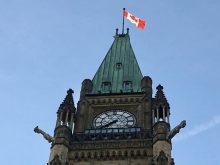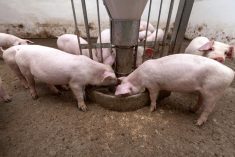Our farming and feeding operations have fundamental challenges and issues that are not being communicated in an effective manner to government.
We have ongoing issues about hiring qualified managers and workers; with WCB compliance and enforcement; OH&S adherence; WHMIS (Workplace Hazardous Materials Information System) education of our employees; an obsolete farm taxation model utilizing 25-year-old land assessments which have resulted in municipal head taxes that pits one municipality against another; an ever-growing burden on our employees from increasing income taxes; carbon taxes — in general, our farms’ ability to compete.
Read Also

Tara Sawyer, former Alberta Grains chair, wins provincial byelection
Tara Sawyer, former chair of Alberta Grains, has been elected to the provincial legislature in the riding of Olds-Didsbury-Three Hills.
On top of this, keeping an open border with the U.S. and access to other markets is an issue that keeps me up at night.
I’m sure everyone in the beef industry shares these concerns. But I’m concerned they are not being properly communicated to government. In my opinion, the beef industry does a poor job of this — not for lack of intelligence or enthusiasm, but there is a lack of unanimity on these issues.
Here is the current structure of our industry and the agendas they promote:
Alberta Beef Producers (ABP) — claims to be the voice of the Alberta beef industry and to represent all aspects of production. Formed in 1969.
Alberta Cattle Feeders Association (ACFA) — voice of the cattle feeding industry, although ABP has a cattle feeder council that it claims represents the sector. Formed in 1973.
Western Stock Growers Association (WSGA) — formed in the early 1900s and has long claimed to represent the cow-calf sector. Has a strong political agenda and believes government should not be involved in its business. A very credible organization.
Alberta Grazing Leaseholders Association — formed in 1997 to negotiate fair government grazing lease rates. Claims to represent leaseholders in matters of land use, property rights, and surface rights.
Feeder Associations of Alberta — provincial government guaranteed, cattle financing option but also promotes political policies outside its mandate from time to time.
Alberta Cattle Breeders Association — claims to represent seedstock producers, aims to promote excellence in breeding and achieve optimum value through benchmarking of bulls’/heifers’ performance. Involvement in semen, embryos, and live cattle internationally means it undoubtedly has government’s ear from time to time.
Alberta Riparian Habitat Management Society – Cows and Fish — seeks to enhance landscape health and productivity through improvements in grazing in riparian areas.
National Farmers Union — from time to time likes to express an opinion on the Alberta cattle industry.
Livestock Identification Services — governs brands and cattle movement from one owner or pasture to another owner or location. From time to time has a political message to government.
Livestock Markets Association — brings sellers and buyers together and facilitates the financial transaction through identification of animals and ensuring the buyer has clear title.
Then there are all the national organizations that Alberta producers support: the Canadian Cattlemen’s Association, National Cattle Feeders’ Association, Canadian Beef Cattle Check-Off Agency, Beef Cattle Research Council, and so on. All have input to the Alberta government.
I don’t mean to minimize any of these groups. I have been involved in this industry for over 40 years and helped form one of the ‘additional’ groups.
But how would governments ever know that they are making the right decisions for the Alberta industry? In my opinion, I don’t believe government can make a decision because all the above associations are sending different messages to government.
This has to stop.
As sophisticated business people, we as an industry need to create a better organization. I say this with respect to my fellow Alberta producers. But when we have at least 10 organizations representing the beef industry in Alberta, it is quite frankly a joke.
It demonstrates to me and to government that the existing organizations cannot represent our industry to government with a high degree of success.
Last year, I moved a motion at the ACFA annual general meeting that it get together with the ABP to come up with a plan for these two organizations to work together. The two groups have since discussed how to improve their relationship.
I applaud those efforts, but the discussions centred on the collection and administration of checkoff dollars. This is a positive step, but falls way short of addressing the main issue.
Again, who is representing your interests, and mine, to government?
We need to face the facts. The message the beef industry sends to government is divisive, inconsistent, and, in many cases, has little to do with the business of the industry. We should be ashamed of ourselves.
Let’s use this initiative started by ABP and ACFA to completely overhaul our representation and structure of Alberta’s beef industry. Let’s not rush to force a ‘vote’ on checkoff dollars this fall when the important issue is to consider — once and for all — how the industry should be represented and how that representation should be structured and governed.
I look at dairy farmers and how they are completely united. We can learn from their model. The dairy industry lobby is so entrenched and powerful, the federal and provincial governments are actually scared to speak against its policies.
We, as an industry, need to cross the bridge on representation in our industry. If we can’t, then we will continue to flounder and send mixed messages to governments. And when governments get conflicting messages, they will usually do nothing.
I will gladly pay a non-refundable checkoff if we have the right representation, structure, and governance in place. Now is the time. Let’s fix our industry representation, once and for all.
Rick Paskal is president of Van Raay Paskal Farms Ltd.















